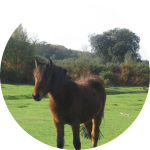| Home |
Welcome to the Horse Stall |
|
Horse Stall contains all types of information for Horse Lovers.
There are a number of products branded horse gifts and products.
Horse Articles :: Colic in Horses
|
Horse Colic
|
|
Enterolith formation is a serious problem that causes colic in horses. Left untreated, these mineral stones will continue to grow in the intestional tract, causing colic and intestinal obstruction, a potentially fatal condition. Colic and Enteroliths There are a variety of conditions that can cause colic in horses. Feed impactions, gas build up, intestinal displacement, excessive sand in the intestinal tract and parasites are among the most common causes of abdominal problems. Enteroliths, or stone formation in the intestinal tract, are a less common cause of colic in most horses. Because colic due to the presence of enteroliths can be fatal, and almost always requires surgical intervention, it is important for horse owners to be familiar with the causes and signs of enteroliths in horses. Enteroliths, also known as “stones” are just that- a multi-layered deposit of magnesium, phosphorous and other minerals built up around a foreign object in the intestines. Much like an oyster is formed around a pearl, enteroliths can form from the smallest piece of wood, metal, plastic that is accidentally ingested. Over time, minerals from the hay slowly build up around the stone, slowly increasing its size. While some horses may pass smaller (golf ball size) stones in their feces, most are unable to pass, and continue to grow in the intestinal tract. Left untreated, the stones can become larger than bowling balls, and weigh over 20 lbs. As the stones grow in size, they can become lodged in the gradually narrowing intestinal tract, causing an obstruction and leading to abdominal pain of varying severity. If left untreated, this intestinal obstruction can rapidly lead to a rupture of the intestines, an always-fatal condition. While enteroliths are a relatively uncommon cause of colic in many areas, several geographic locations have an extremely high incidence of occurrence. Horses in California are at particularly high risk for stone formation due to the sandy soil and alfalfa hay grown there. In fact, a study at UC Davis found that a full quarter of colic cases treated there were due to enteroliths, compared to a national average of less than 5%. As previously mentioned, alfalfa hay has been found to contribute to enterolith formation. In fact, more than 99% of horses with enteroliths had diets comprised of at least 50% alfalfa. Alfalfa hay has significantly higher levels of magnesium, which can contribute to the formation of enteroliths. Several breeds of horses have been found to be more prone to enteroliths than others. Arabian and Morgan horses in particular have a higher incidence of Enterolith formation than many other breeds. Special care should be taken with horses of these breeds to develop a balanced diet to minimize risk of enterolith formation. The most common sign of enteroliths in horses is a recurring, mild colic. As the stone or stones move through the intestinal tract, they can cause discomfort and colic signs. These signs often disappear with administration of pain medication, but can reoccur frequently. Horses with enteroliths are often hard keepers, have a poor work ethic, and may have occasional loose stool. Over time, the enterolith continues to grow, and in most cases it will eventually become lodged in the intestinal tract, causing an obstruction. Horses with an obstruction will often show severe colic signs, and surgical intervention must be taken immediately to remove the stones and prevent intestinal rupture. The only non-surgical way to diagnose enteroliths in horses is via abdominal X-ray. In many cases, a stone or stones may be visible on the X-ray, aiding in diagnosis. However, a horse with a seemingly normal X-ray may still have stones- they cannot always be seen via radiographs, due to the large size of the horses abdomen. Exploratory Laparotomy, or colic surgery, is the only way to treat enteroliths. Surgery will be performed to thoroughly inspect the entire intestinal tract of the horse, and remove any stones within it. This procedure generally has a high success rate, unless there are complications within the intestinal tract. There are many ways to help prevent the formation of enteroliths in horses. Eliminating or reducing the alfalfa content in the diet is perhaps the most important form of prevention, especially in high-risk horses such as Arabians and Morgans, and horses who have a history of stone formation. Because the formation of enteroliths has been associated with a high intestinal pH level, feeding vinegar to your horse may help to reduce the pH level in the gut, and inhibit stone formation. In addition, increasing the frequency of feedings, and regular exercise all promote a healthy intestinal tract, and can contribute to reducing the formation of stones. Although relatively uncommon in many areas, enteroliths are a potentially fatal threat to your horse. Those living in areas known for having higher incidence of stones, and owners of high-risk breeds should work closely with their veterinarian to develop a care program to help minimize the risk of enteroliths. For more great articles make sure to visit and add http://www.horsechitchat.com to your bookmarks. About the Author |
Top Horses |
|
| Top Horse Movies | |
Horse Resources |
|
Horse Health |
|
Horse Breeds |
|
More Horses |
|


| Copyright 2005-2021 DR Management All rights reserved |
Dog Gifts | Wildlife Gifts | Handmade Horse Gifts |
